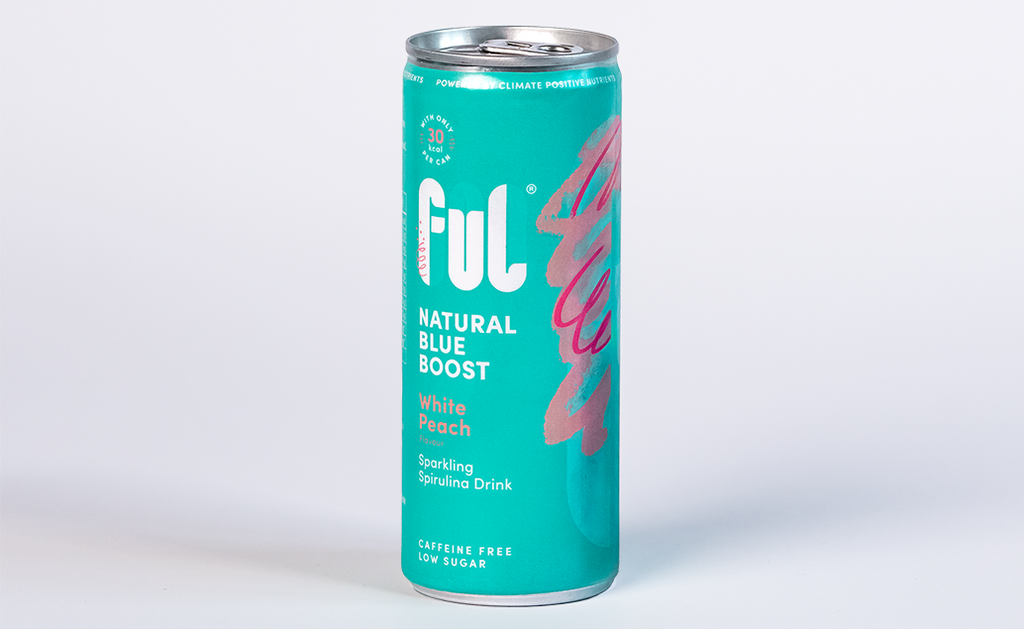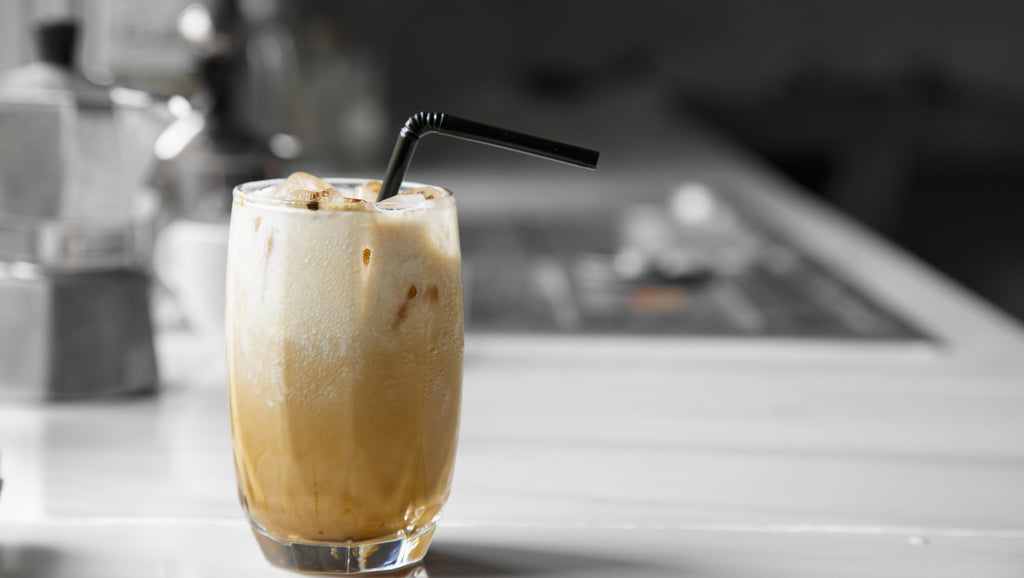
Key points
- Proper hydration is essential for children and teenagers alike.
- A lot of children prefer to drink fizzy drinks and other sugary beverages instead of consuming plain water for hydration, which is why it’s important to offer them other healthy alternatives.
- The best healthy drinks for children and teens include FUL® sparkling spirulina drinks, homemade flavoured water, milk, coconut water, herbal tea, juice, and smoothies.
It's common knowledge that kids almost universally have a sweet tooth and prefer to consume sugary food. That is why, when asked what they want to drink, the majority will go for Coke, Dr. Pepper, or another popular fizzy drink. Of course, consuming beverages with added sugar increases your child's risk for heart disease, obesity, and weight gain. These beverages also have no other benefits besides their sweet flavour. In this article, we'll talk about healthy beverages for teens and children that will not only keep your kids hydrated but also provide them with vitamins and other essential nutrients.
How Much Should Your Kid Drink?
Everything depends on the age and level of activity of your child:
- Children between the ages of 4 and 8 should consume up to 1.2 litres of fluid daily.
- Children over the age of 9 should drink at least 1.5 litres of fluid each day.
The amount of fluid consumed should be even higher on hot summer days or days when your child has increased activity. So let's talk about the best beverages for hydrating your child or teenager.

FUL® Sparkling Spirulina Drinks
Have you ever tried giving your child supplements or superfoods? If so, you're probably aware of how difficult it is to persuade a child to take that vitamin pill, which is often neither tasty nor appealing. However, we have a two-in-one solution for you - FUL® sparkling spirulina drinks will not only hydrate but also nourish your child with dozens of beneficial nutrients! FUL® is a premium spirulina supplement that offers superior bioavailability and a range of health advantages. The spirulina extract used in FUL® sparkling drinks is rich in vitamins, minerals, and antioxidants. Let's quickly go over a few of them and discuss the advantages they offer:
- Vitamin C: keeps the immune system functioning well;
- Calcium: supports the digestive system and strengthens bones;
- Vitamin B2: essential for maintaining good energy levels;
- Magnesium: promotes nerve and muscle function;
- Potassium: supports normal blood pressure levels and controls hydration.

The main advantage is that you won't even have to ask children to drink FUL® spirulina drinks. Unlike spirulina powder or tablets, which smell and taste repulsive, to say the least, FUL® sparkling drinks are so delicious that your child or teen will beg to drink another bottle or can.

Water
The most basic of all basics is water. When your kids say they are thirsty, you should offer them a glass of water first, as it is the best beverage for quenching thirst and hydrating the body. Moreover, water is essential for organ function as well as temperature regulation. Since water has no calories, your child won't feel full before meals and won’t gain weight as a result of drinking too much water.
If your child refuses to drink water because it is tasteless, try flavouring it with herbs and fruits. There are dozens of options: you could use a lemon wedge, some mint, cucumber, berries, or a few drops of orange juice. You can even try to involve the child in the cooking process so that they have a stronger incentive to finish the drink they made themselves. Additionally, keep in mind that dehydration can impair a child's cognitive development and cause exhaustion and fatigue, so your child should always have access to clean water.

Milk
While many children prefer sweetened beverages such as strawberry or chocolate milk, it is far healthier to supplement your child's diet with plain milk. Milk contains nutrients that are essential for a child’s growing body:
- Protein helps with daily growth and gives your child energy;
- Calcium helps to build bone mass;
- Vitamin D is responsible for the development of muscles and bones;
- Phosphorus helps in the formation of teeth and bones.
If no other dairy products are present in the diet, nutritionists recommend that children drink 350–400 ml of milk on a daily basis.
Whether milk with a higher fat content is better than lower fat options is a topic of debate. Milk with 2% fat may be better for bone development and brain function, but some parents prefer giving fat-free milk to their children in order to limit their calorie and fat consumption. But if you limit the amount of milk your child or teen consumes and only give a small amount of higher fat milk during meals, there is nothing wrong with it. However, if your child has lactose intolerance, switch out dairy products for lactose-free milk or soy beverages that are calcium-fortified.

Coconut Water
This beverage is probably not the first thing that comes to mind when you think about how to hydrate your teen. Unexpectedly, coconut water is one of the healthiest options because it is low in calories, fat- and sugar-free, and rich in a variety of beneficial nutrients. First and foremost, coconut water is the primary source of calcium, magnesium, and vitamin C, all of which are essential for growing children. Since coconut water also contains electrolytes like potassium and sodium, it can help your child recover from dehydration brought on by diarrhoea or vomiting. It can also help you regain energy after physical activity. The best coconut water for your child is plain coconut water without added flavours.

Herbal Tea
Due to its high caffeine content, tea may not seem like a drink that is suitable for children. On the other hand, herbal teas, such as chamomile, mint, and lemongrass teas, are caffeine-free, tasty, and have numerous health benefits for children.
Chamomile Tea
The herb chamomile is used to treat anxiety and nausea because of its well-known calming and soothing effects. Additionally, this type of tea has potent anti-inflammatory properties, making it the ideal beverage to give your child when they are ill.
Mint Tea
Mint is effective at calming a child's upset stomach and reducing motion sickness. It is also a useful beverage for treating colds because it helps with a sore throat, coughing, and stuffy nose.
Ginger Tea
Ginger protects the liver and is excellent for cough and cold relief. Additionally, it is the best option for treating respiratory conditions like bronchitis or whooping cough.
Lemon Balm Tea
Tea made from lemon balm is good for a child's nervous and digestive systems.
It's important to keep in mind, though, that these beverages shouldn't be given to children every day unless a paediatrician is consulted first. They should be fine to drink for your teens, though.

Juice
Fruits and vegetables are an essential part of a child's diet because they give the body vitamins and nutrients that lower the risk of many diseases. Giving your child or teen fruits and vegetables in the form of juice is one way to supplement them. However, you must choose only 100% pure juice because it doesn't have any added sugar.
Keep in mind that juice is high in calories and can lead to obesity, so you should still keep its intake to a minimum. The recommended daily juice allowance for children under the age of 6 is 180 ml, while the allowance for children aged 6 to 18 is 355 ml.
Another good option is to experiment with making your own juice drinks. You will need a carrot, a couple of oranges, honey, and a few mint leaves.
Simply put all the ingredients through a juicer, then add the honey and mint at the very end. You will get a beverage rich in beta-carotene, fibre, and antioxidants. Additionally, it will be much healthier than store-bought juice!

Vegetable and Fruit Smoothies
Smoothies are the best option for picky eaters, as you can hide any vegetables, greens or fruits which otherwise would make your child refuse a meal in a sweet and bright-looking cocktail. You can try to mix kale and pineapple, spinach and blueberries, strawberries and beets, and all of them will taste delicious and be super healthy for your child. You can also try some recipes with non-dairy or dairy-based milk or add some supplements such as avocado, coconut or seeds to the smoothies. But avoid store-packed smoothies, as those contain a lot of added sugar and sometimes are pasteurised, which means the vegetables and fruits in them have lost some of their beneficial properties.

Caffeinated Beverages
Many parents don’t control their children's caffeine consumption even though they should. For example, even if your child doesn’t drink coffee, fizzy drinks and tea contain caffeine, which can be harmful to a child's health. Studies show that children who consume caffeine experience jitteriness, anxiety, rapid heartbeat, and disrupted sleep patterns. Because of this, it's crucial to keep your child from consuming these beverages until the age of twelve and then limit their daily caffeine intake to between 85 and 100 mg. Try to wait until your child is 12 years old to introduce them to beverages like coffee or black tea, and even then, limit their consumption.
Final Thoughts
The primary parental responsibility is to care for your child's health. And hydration is a big part of this. You need to know what your child consumes and in what amounts to ensure that they stay hydrated.
We hope this article helped you gain a better understanding of the types of drinks that are healthy and nourishing for teens and children and gave you some fun ideas for experimenting. Of course, we also hope that your picky eater will now have a chance to enjoy other beverages and won't ever beg for soda again!
FAQ
Which health drink is best for teenagers?
Water is an essential health drink. It means that water works best with hydrating your body and ridding it of toxins. FUL® sparkling spirulina drinks are another excellent beverage alternative for teens, as they are stylish, packed with nutrients, delicious, and easy to bring to school or after-school activities.
What drinks can I substitute for soda?
The best substitutes for fizzy drinks and soda for teens and children are FUL® sparkling spirulina drinks, homemade ice teas, homemade lemonade, sparkling water, tea, smoothies, and coconut water.
Is apple juice good for kids?
Apple juice typically helps people stay hydrated and is a good source of potassium and vitamin C. However, because juice contains a high number of calories, its consumption should be limited.


